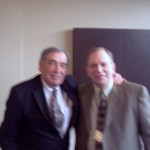With the indictment of Maria Butina for conspiracy and acting as an agent of the Russian government, public attention has come upon the Fellowship Foundation. Founded by the late Doug Coe, I crossed paths with the FF beginning in 2009 when Ugandan affiliates of that organization promoted the death penalty for GLB people in the Ugandan Parliament via the Anti-Homosexuality Bill. I took a strong stand against that bill which eventually led to an invitation to the National Prayer Breakfast, hosted each year by the Fellowship. While there, the American leaders allowed me to interview Doug Coe — one of only four published interviews of the reclusive founder — so that he could tell the public in clear terms that he did not favor criminalizing homosexuality.
Now via the documents describing the indictment of alleged Russian operative Maria Butina, the National Prayer Breakfast is again in public focus. The documents refer to an organizer of the prayer breakfast and various individuals who Butina contacted. While I don’t know for certain in each case who she contacted, a source close to the Fellowship told me that Doug Burleigh, the son-in-law of Doug Coe, is the person at the organization who handles networking with the Russian affiliates.
Burleigh Predicted Trump and Putin Would Have a Breakthrough
Almost exactly a year ago at the Russian version of the prayer breakfast, Doug Burleigh made a prediction. A news article from the Russian Evangelical Alliance tells the story:
On another note, Doug Burleigh from Washington’s National Prayer Breakfast forecast that “a breakthrough in relations between Russia and the USA is about to occur. The greatest possible hope for Russia and the USA is friendship between our nations. I believe that Vladimir Putin and Donald Trump will yet become friends.” (Reverse translation from the Russian.)
I wonder how Burleigh knew such a breakthrough was about to happen. Prophecy? Or perhaps he was on the inside of efforts to make it so. According to the indictment documents, the National Prayer Breakfast organizers were aware of a desire to bring Vladimir Putin to the event. Butina also promised to keep them apprised of new developments in the effort to improve relations between the two nations and the two presidents.
The refusal of Donald Trump to criticize or hold Vladimir Putin accountable has puzzled numerous observers. Behind the scenes, an effort to craft a friendship between Trump and Putin has been in operation for several years.
Were the Russians using the National Prayer Breakfast as a ploy to advance political goals? Is the talk of faith a means to a darker end? Butina will have her day in court and I hope evangelicals who went along for her ride will watch and listen carefully.
READ THE AFFIDAVIT AND THE COMPLAINT.
Read Today’s Filing Asking the Court to Prevent Butina’s Flight
Jeff Sharlet’s book on the Fellowship can be found here.
Like this article and want to see more like it? Support this blog at Patreon.com.
